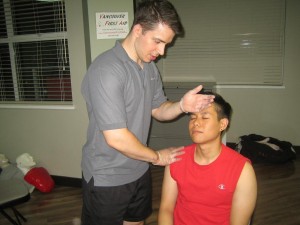Roseola is a minor infection that typically affects children starting at 2 years old but it can also affect adults. Roseola is caused by two strain of herpes virus which causes several days of fever and then it is followed by a rash.
If a child is exposed to someone with roseola and infected with the virus, it takes a week or two for the symptoms of infection to happen. Some roseola symptoms include the following:
- The symptoms begin with a sudden high fever, greater than 103 F (39.4 C). Sometimes there is a slight sore throat, runny nose or cough together with the fever. The lymph nodes in the neck can swell along with a fever and will last three to five days.
- When the fever diminishes, a rash will develop, but not in all cases. The rash consists of small pink spots or patches and they are flat and some are raised. There is a white ring found around in some of the spots. The rash begins on the chest, back and abdomen and then it will spread to the neck and to the arms. The rash does not cause itchiness and can last for hours or several days before disappearing.

Other possible symptoms
- There is irritability in children and infants
- Fatigue
- Mild diarrhea and runny nose
- Swelling eyelids
- Loss of appetite
Causes of roseola
The common cause of roseola is the human herpes virus 6, but it can be caused by another herpes virus, which is the herpes virus 7. Roseola can be spread from one individual to another through close contact with the respiratory secretions or the saliva of an infected person. Roseola is contagious even without a rash and it can spread to other person even with only a fever. This infection can happen anytime of the year.
Sometimes, the infected child can experience seizures caused by an increase in body temperature. The child can sometimes loss consciousness and jerk his/her arms, legs or head for several minutes. He/she can lose bladder or bowel control temporarily. Fever related seizures are not very harmful.
Treatment and home remedies
- Give the child plenty of rest until the fever disappears.
- Let the child rink plenty of fluids like water, ginger ale, lemon-lime soda, clear broth and an electrolyte solution like the Pedialyte in order to prevent dehydration. Eliminate any gas bubbles from carbonated fluids by shaking or stirring the beverage. You can learn more about dehydration prevention by enrolling in a course on first aid
- Give the child a lukewarm sponge bath or a cool washcloth placed on the child’s head can soothe the discomfort of a fever, but avoid using ice, cold water, fans or cold baths in order to prevent a chill.
Prevention of roseola
In order to prevent the spread of roseola is to avoid exposure of a child to an infected child/person. If the child/person is infected with roseola, keep him/ her at home, do not go to work and get some rest until the fever disappears. There is no vaccine to prevent roseola. Adults who never had roseola as a child can become infected in the future, but the disease can be mild, but they can still pass the virus on to other people.
